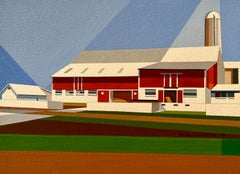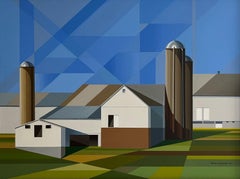Edmund Lewandowski for sale on 1stDibs
Regarded as a leading American precisionist and exemplary arts educator, Edmund D. Lewandowski once explained that his “overwhelming desire . . . through the years has been to record the beauty of man-made objects and energy of American industry,” a goal he successfully achieved in a career that spanned five decades and numerous locations, including the American Midwest, South, and New England. Born to Polish parents in Milwaukee, Wisconsin, Lewandowski attended the Layton School of Art, studying under regionalist artist Gerrit Sinclair. Inspired by Sinclair’s modern style and urban subjects, Lewandowski’s early paintings reflect a similar approach that would later evolve to industrial themes executed in a hard-edged precisionist manner. His most well-known subjects include chemical plants, shipyards, factories, farms, and oil rigs.
Following graduation, Lewandowski worked as a public school teacher and commercial artist while pursuing his painting. His career took a significant step forward when, in 1936, his work caught the eye of the progressive art dealer Edith Halpert, who offered him representation at her celebrated Downtown Gallery in New York City. A key figure in modern art, Halpert encouraged Lewandowski to experiment with Precisionism and to remain in Milwaukee. In 1937, Lewandowski met Charles Sheeler, considered a leader in the American Precisionist movement, whose style would most significantly influence the younger artist’s career. Through his association with the Downtown Gallery and the work he executed for the Federal Art Project between 1936 and 1939, Lewandowski attracted important critical notice and was included in exhibitions at such notable institutions as the Metropolitan Museum of Art, Museum of Modern Art (Magic Realism exhibition), and Art Institute of Chicago during the 1940s alone. At the Downtown Gallery, he exhibited alongside other artists such as Charles Demuth, Georgia O'Keeffe, Ralston Crawford, George Ault, and Niles Spencer.
Following military service as an Air Force mapmaker and camouflage artist from 1942–1946, Lewandowski joined the faculty of his alma mater, the Layton School of Art, in 1947. From that time on, he divided his time between creating art and teaching another generation of aspiring artists. His teaching career took him to institutions throughout the United States, including Florida State University. Following his tenure at Florida State, Lewandowski returned to Layton as its director, remaining until 1972. Throughout these years, the artist would create and exhibit works on paper and canvas, as well as execute commissioned large-scale mosaic murals. In 1973, Lewandowski joined the faculty at Winthrop University in Rock Hill, South Carolina, where he would serve as the art department chair until his retirement in 1984.
Edmund Lewandowski’s art showcases an exacting technical skill honed in his early training and advanced by his relationship with Sheeler. His ultrarealistic works painted in watercolor, gouache, or oil range from early farmscapes to industrial scenes and marine subjects, a variety that reflects the artist’s constant quest for aesthetic evolution. Today, Lewandowski’s work can be seen at prestigious national museums.

